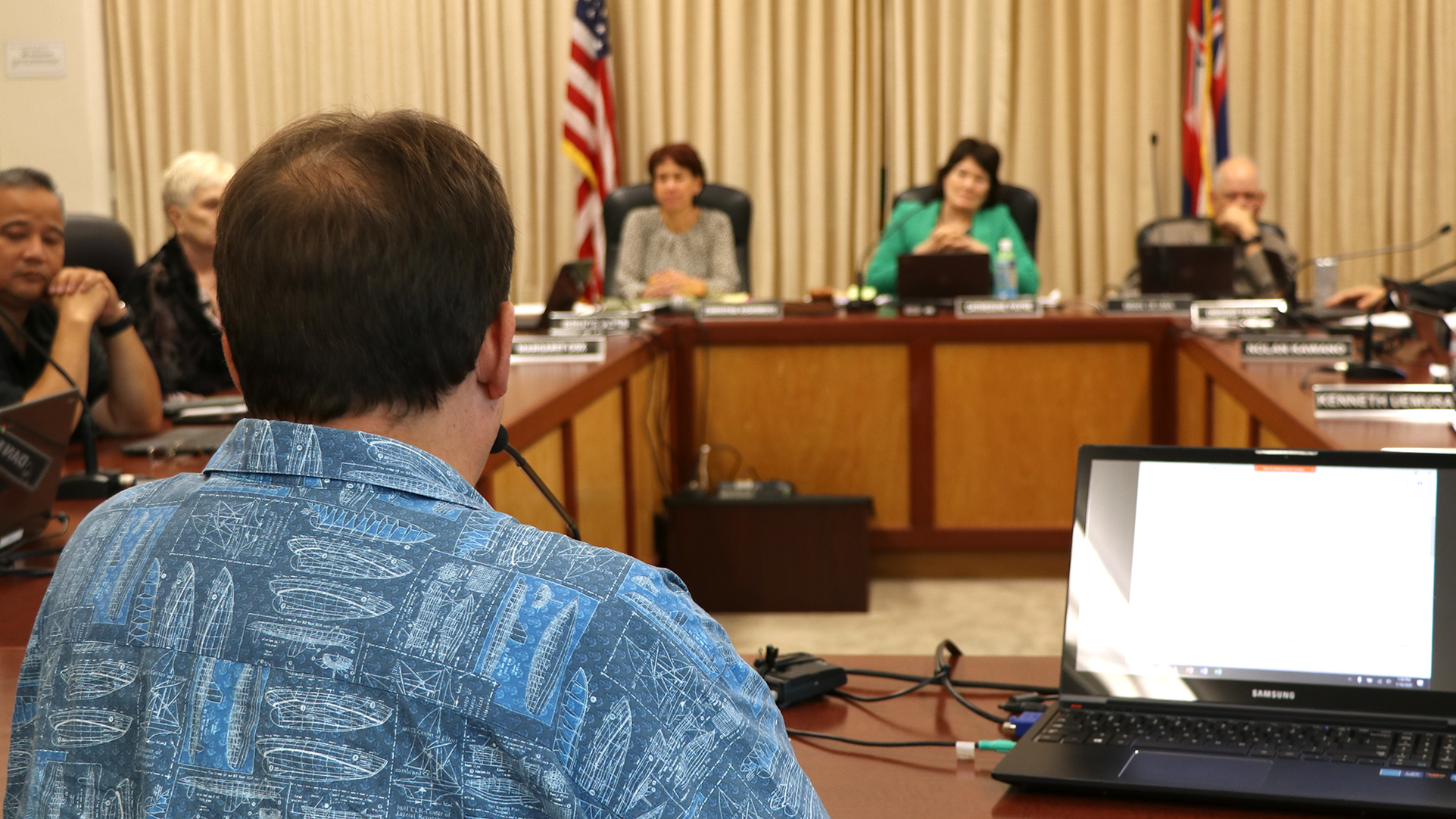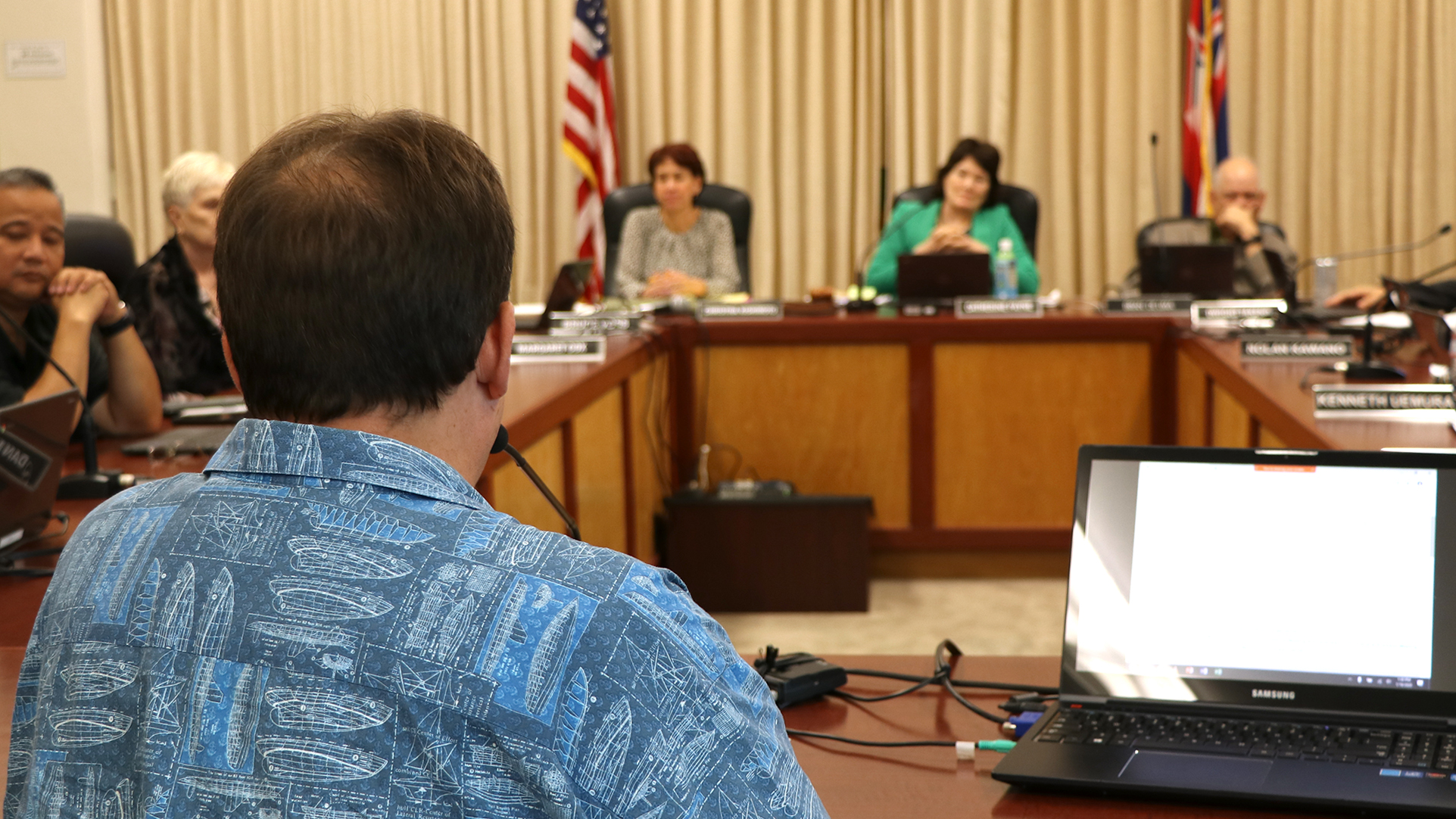
HSTA President Corey Rosenlee testifies before the Board of Education and Schools Superintendent Christina Kishimoto during Thursday's general business meeting.
The Board of Education chair said Thursday that a long-overdue salary adjustment for thousands of veteran Hawaii educators has a “very high priority” as the Department of Education revealed the roughly $46 million cost which state lawmakers need to approve to make those raises happen.
“This is a bold step to finally take care of this problem to make sure that every keiki in Hawaii has a qualified teacher,” said HSTA President Corey Rosenlee in testimony to the BOE Thursday.
The HSTA’s research shows roughly 7,000 teachers who’ve taught more than ten years in Hawaii public schools would receive annual raises of anywhere from $900 to $17,000 by placing them on the salary step that properly reflects their years of service. During the recession, thousands of HSTA members did not receive regular step increases, leading to a problem called compression, with nearly 6,000 educators now clustered between Steps 9 and 11 on the scale that goes up to Step 14B.
DOE Superintendent Christina Kishimoto told Thursday’s BOE meeting, “We are pushing very aggressively forward.”
Click here to watch this video on YouTube.
'It cannot be done without legislative support and funding'
Assistant Superintendent Cindy Covell told board members, “If we don’t fix the pay issue, all the other things we are doing will just have minimal effect. We don’t want to continue around the edges, we want to support your vision and the superintendent’s vision of being bold, and that’s what this does.”
“It cannot be done without legislative support and funding. There’s no way that this department can fund this initiative,” Covell added.
Covell said the DOE is asking lawmakers to fund the approximate $46 million cost of the salary adjustment so veteran educators could begin getting paid more next fall.
“We’ve done some preliminary work with HSTA on the numbers. We know where the step compression is,” Covell added. “Some (teachers) have 23 or 24 years and some have eight or nine and they’re getting paid the same thing.”
“Study after study after study tells us that experienced teachers have more effect on student achievement. They learn more and they get better at their trade and we want to keep them,” Covell said.
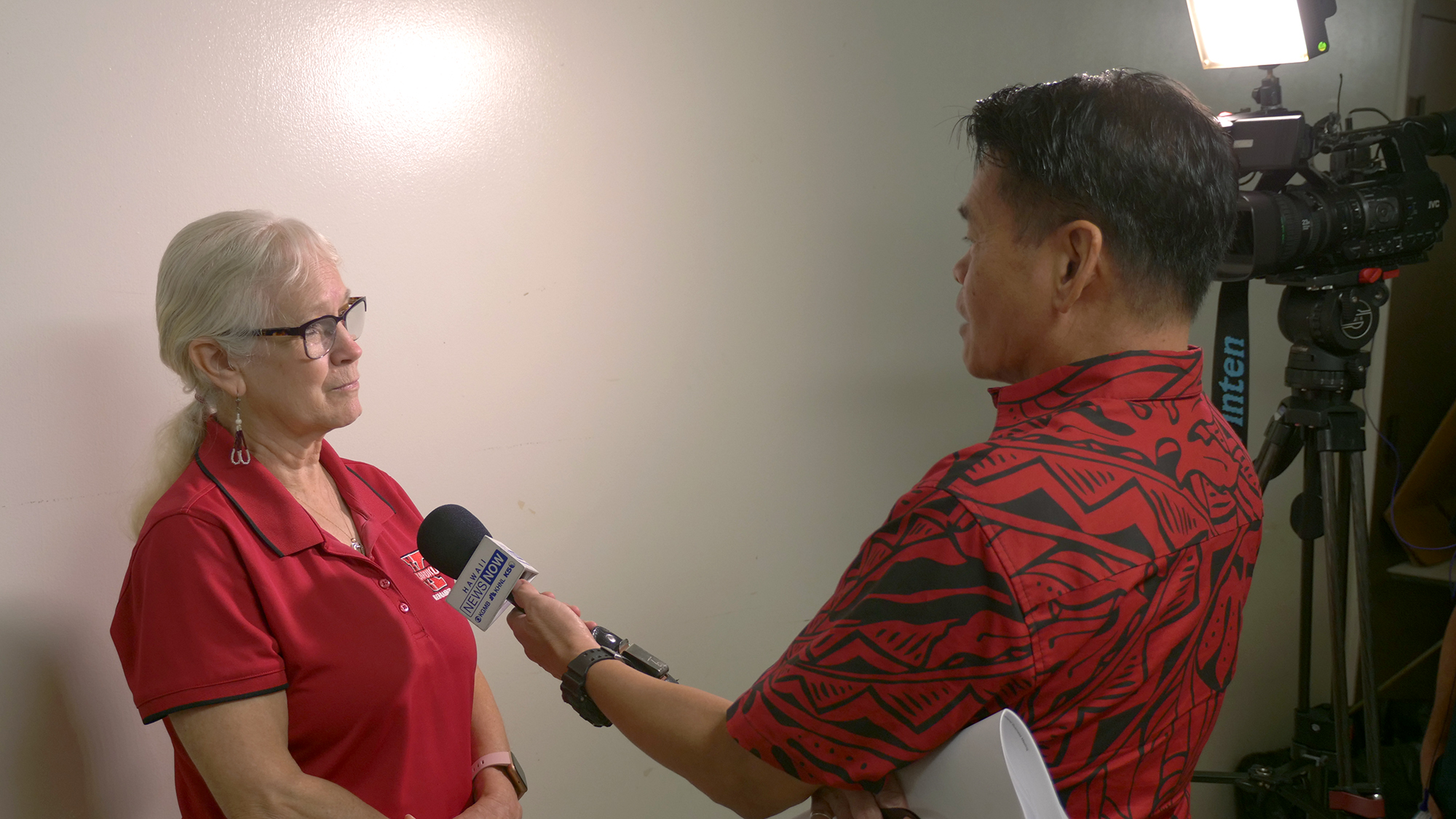
Hawaii News Now reporter Ben Gutierrez interviews Kahuku High and Intermediate teacher Bea DeRego. View HNN's coverage here.
Veteran Kahuku teacher says too many 'experienced pros' are leaving
In testimony Thursday, Kahuku High and Intermediate teacher Bea DeRego said, “The salary compression blemish must be addressed immediately to provide all students with qualified and experienced teachers in every classroom every year.”
She said many experienced colleagues are leaving because their salaries have not kept up with Hawaii’s high cost of living.
“This exodus will instantly reduce Hawaii’s potential to provide a first-class education for all students regardless of their status. The teachers leaving are the most experienced pros who have managed waves of changes,” said DeRego, who spent most of her 22-year career as an English teacher. She is now the test coordinator at Kahuku.
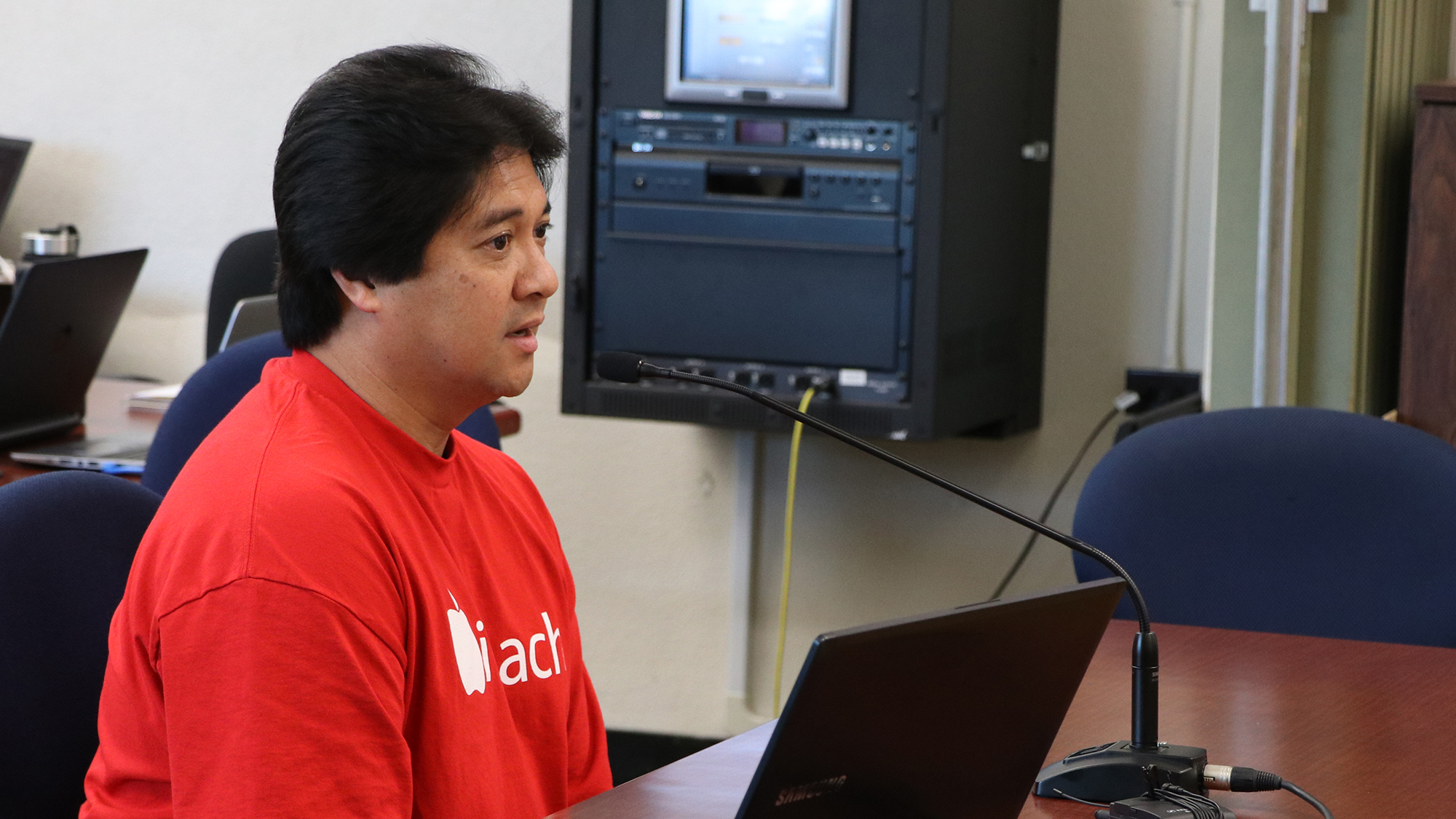
Leilehua High early college coordinator James “JJ” Cabralda testifies before the board.
Leilehua teacher: 'I would like to stay here because this is my home'
James “JJ” Cabralda has spent nearly 20 years teaching in Hawaii, all of them at his alma mater, Leilehua High, where he’s now the early college coordinator.
“I feel it’s important to help teachers like myself who remain loyal to the school and the community, to live here. The price of paradise is hard,” he told the BOE.
“And if nothing’s going to be done about this, we will see a lot of experienced teachers leave the islands. They might not leave the profession, but they will leave the state so that they can afford to live,” Cabralda said. “They’ll look elsewhere.”
“I would like to stay here because this is my home. And so having this salary compression rectified will help me to stay at this school that I want to be dedicated to and continue to help the students in my community,” Cabralda added.
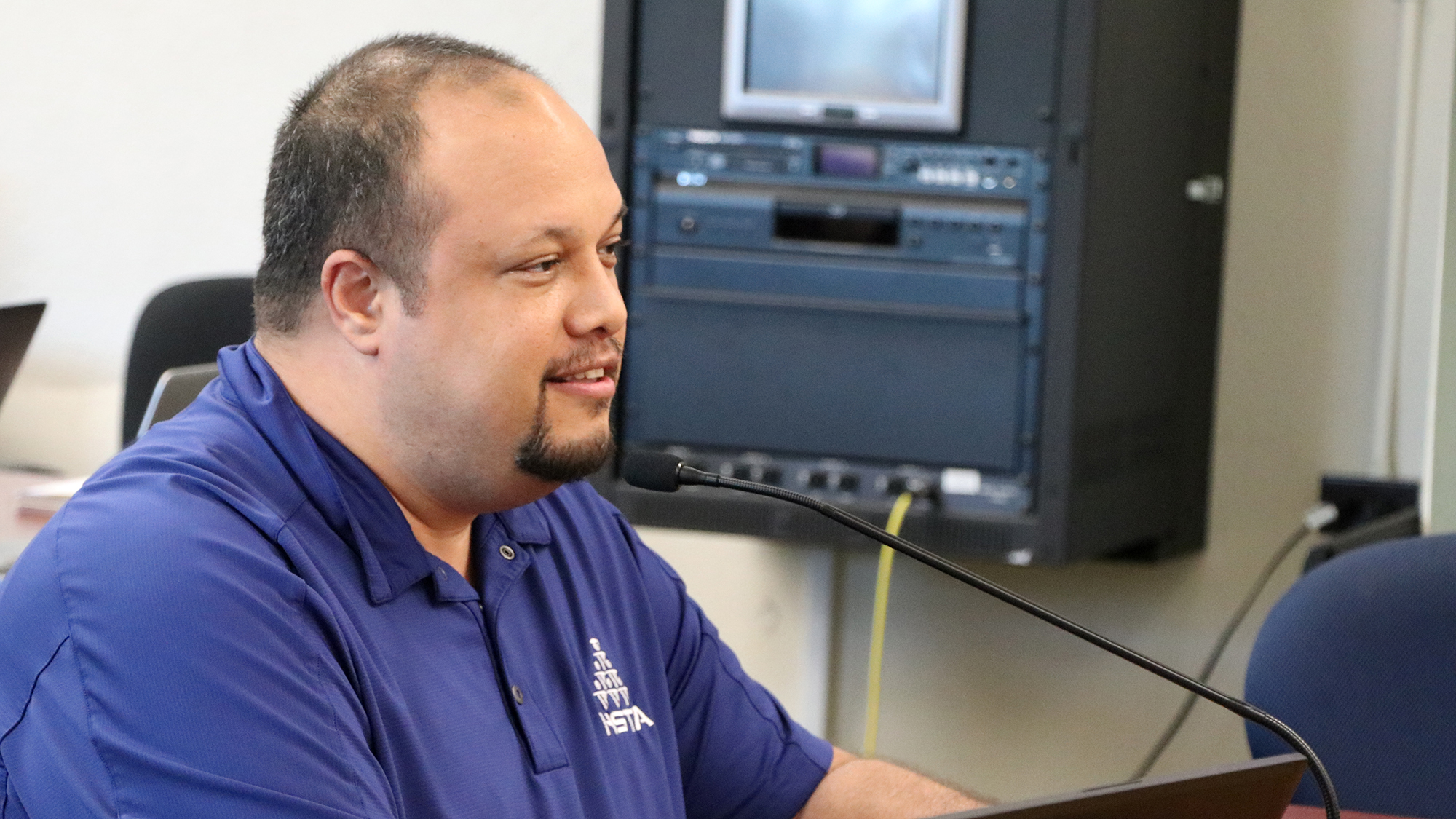
HSTA Vice President Osa Tui Jr., who testified before the Board of Education Thursday, was also affected by salary compression.
HSTA VP has heard experienced teachers say ‘I may not retire now, I might just stick around'
HSTA Vice President Osa Tui Jr. experienced Hawaii’s longstanding teacher shortage in English class when he was an eighth-grader at King Intermediate nearly three decades ago.
"We had six teachers before we finally got someone who was willing to stay. And this is happening throughout our state. Our kids don’t have a teacher who they can rely on. Hundreds of classrooms where they don’t have a teacher who’s permanent, who’s stable,” Tui said.
“Even from when I was young until now, nothing’s been happening. And so I thank all of you for finally getting the ball rolling,” he told DOE and BOE officials.
“I’ve been fortunate to go around the state and I’ve heard teachers actually say, ‘I may not retire now, I might just stick around,’” Tui added.
Rosenlee, president of the 13,700-member HSTA, said, “If you look at the way we do salary in Hawaii, we are different from the entire United States. It is standard to pay teachers more for years of service. We do not do that in Hawaii.”
“We have teachers with nine years and 23 years getting paid the exact same salary. We have teachers with 30 years who are not at the top of the scale,” Rosenlee said. “This is a huge structural failure that needs to be solved.”

Kishimoto and the Hawaii Board of Education
Board of Education members said they understood the urgency to improve educators' salaries.
BOE member Bruce Voss told colleagues, “I support addressing the teacher pay compression issue as soon as possible.”
“Time is important, not just for the Legislature, but for also teachers’ decisions,” Voss said. “The practical reality is that teachers make the decision in the middle of the spring to retire or move because they’d have to do that to get jobs somewhere else. They’re moving. So we need these numbers. We need this plan as soon as possible.”
BOE Chair Catherine Payne said, “This is a very high priority. So as we talk to our legislators, we need to remember to share how important this is.”

